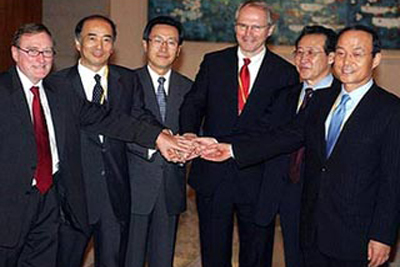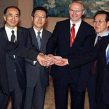
RUSSIA ASSESSES THE NORTH KOREA SIX-PARTY AGREEMENT
Publication: Eurasia Daily Monitor Volume: 2 Issue: 175
By:

The Russian government and media welcomed the six-party agreement about North Korea’s nuclear programs announced on September 19. Izvestiya even called it a breakthrough. Deputy Foreign Minister, Alexander Alexeyev, Russia’s delegate to the talks, hailed it as an historic document that would have been unimaginable six months earlier and a triumph of common sense. Alexeyev also emphasized that the first paragraph of the accord calls upon the DPRK to denuclearize and rejoin the Non-Proliferation Treaty (NPT) regime. He also added that while Russia will extend North Korea economic aid, primarily energy assistance, it would not offer a light-water nuclear reactor (LWR), which is what Pyongyang now demands as a precondition for denuclearization.
Alexeyev also emphasized that whatever Russia does will be based on its own internal legislation and its international obligations together with actions by its other partners. Moreover, North Korea will not receive assistance unless it complies with the agreement to denuclearize. Alexeyev’s statements coincide with the Ministry’s emphasis that the accord lays upon Pyongyang the obligation to “refuse nuclear weapons, all existing nuclear programs, and probably return in the shortest possible time into the treaty on non-proliferation of nuclear weapons and the International Atomic Energy Agency.” But other official reactions are more ambivalent.
Russian media reports indicated that at some unspecified future date the parties would discuss the provision of a LWR to North Korea as called for in the agreement. Simultaneously, the head of the Russian Federal Atomic Energy Agency (Rosatom), Alexander Rumyantsev, stated that Russia is ready willing and able to join in a project to build a nuclear power station in North Korea, so it is hardly clear whether or not and under what conditions Russia will make nuclear power and an LWR available to North Korea. Indeed on September 14 Japanese sources published reports concerning Russia’s growing willingness to supply North Korea with an LWR provided it returns to the NPT and supervision by the International Atomic Energy Agency.
Other opinions are more varied. Konstantin Kosachev, chairman of the Duma’s International Affairs Committee, emphasized Pyongyang’s long record of unpredictability, whereas Major General Nikolai Bezborodov of the Duma Defense Committee openly supported North Korea’s right to a peaceful nuclear program. But Russian media were more unrestrained in their assessments. Moscow Gazeta openly called this accord a victory for North Korea as it won guarantees of energy aid and security, even though it had to promise to renounce its nuclear program.
The government paper, Rossiiskaya gazeta, said that Pyongyang “won the battle of nerves” with Washington, forcing the U.S. to recognize its right to a peaceful nuclear program and to discuss supplying it with a light-water reactor and energy assistance. Washington also had to formally state that it had no intention of attacking North Korea and promise “to respect each other’s sovereignty, to coexist peacefully, and to improve relations.” These media outlets see the accord in this light despite the fact that they and other media, e.g. Politkom.ru, along with Moscow Gazeta.ru, observed that Pyongyang, by demanding a LWR as a precondition for denuclearizing, has reverted to its habitual nuclear blackmail of the other five parties and did so because North Korea remains a socialist state and its negotiators were accused of conceding too much in Beijing.
But since the North’s demand for a LWR has already aggravated the talks, which are to resume in November, it is by no means clear whether this accord can lead to actual implementation of an agreement to denuclearize North Korea. It is clear from all comments to date that negotiating a verification regime and compelling Pyongyang to accept the obligations it has incurred are crucial aspects of any future negotiating sessions. What is clear from Russian commentary and from external observation is that Russia has largely associated itself with China and South Korea’s negotiating postures on this issue and that it was the other two states, principally China, that brokered the settlement.
It also is clear that a viable North Korea is essential to Russia’s broader Asia strategy because it is Russia’s closeness to Pyongyang that makes others take it seriously as a player throughout Northeast Asia, something that was not the case several years ago. Moreover, though the Russian government will never say so publicly, it apparently believes that alignment with China pays dividends in forcing Washington to retreat from positions that Moscow and Beijing regard as “overbearing” and in promoting the creation of a multipolar world or at least a multipolar Northeast Asia. However, by aligning itself with Beijing rather than Washington, Moscow, as many Russian analysts fear, may be exchanging subordination to American policy for subordination to Chinese policy. Ultimately that is — or should be — an even more unpalatable outcome for Russian policymakers.
(Ekho Moskvy, Itar-Tass; Interfax, RIA-Novosti, Channel One TV, September 19; Agenstvo voennykh novostei, September 19, 20; Moscow Gazeta, September 20; Politkom.ru, September 19; Rossiiskaya gazeta, Izvestiya, September 20; Kyodo, September 14, 16)




